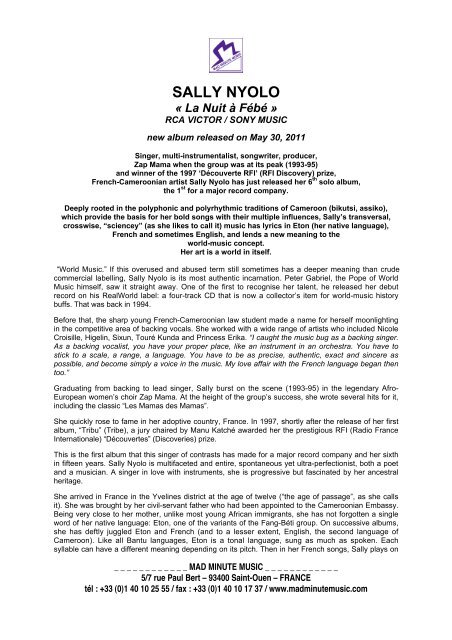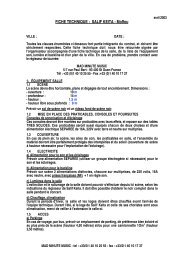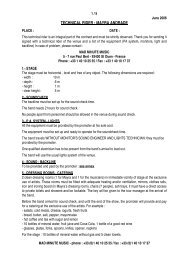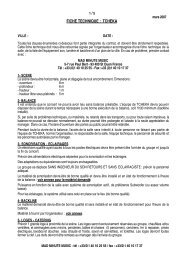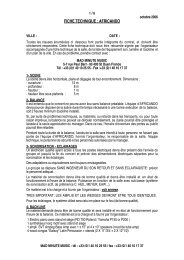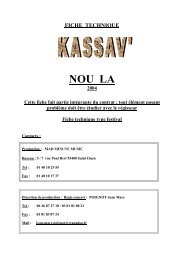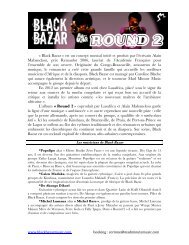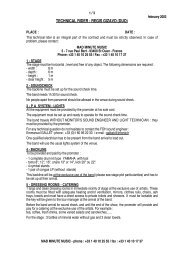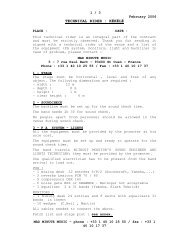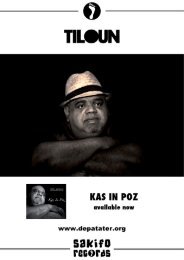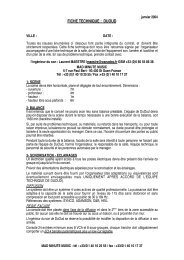SALLY NYOLO - Mad Minute Music
SALLY NYOLO - Mad Minute Music
SALLY NYOLO - Mad Minute Music
You also want an ePaper? Increase the reach of your titles
YUMPU automatically turns print PDFs into web optimized ePapers that Google loves.
<strong>SALLY</strong> <strong>NYOLO</strong><br />
« La Nuit à Fébé »<br />
RCA VICTOR / SONY MUSIC<br />
new album released on May 30, 2011<br />
Singer, multi-instrumentalist, songwriter, producer,<br />
Zap Mama when the group was at its peak (1993-95)<br />
and winner of the 1997 ‘Découverte RFI’ (RFI Discovery) prize,<br />
French-Cameroonian artist Sally Nyolo has just released her 6 th solo album,<br />
the 1 st for a major record company.<br />
Deeply rooted in the polyphonic and polyrhythmic traditions of Cameroon (bikutsi, assiko),<br />
which provide the basis for her bold songs with their multiple influences, Sally’s transversal,<br />
crosswise, “sciencey” (as she likes to call it) music has lyrics in Eton (her native language),<br />
French and sometimes English, and lends a new meaning to the<br />
world-music concept.<br />
Her art is a world in itself.<br />
“World <strong>Music</strong>.” If this overused and abused term still sometimes has a deeper meaning than crude<br />
commercial labelling, Sally Nyolo is its most authentic incarnation. Peter Gabriel, the Pope of World<br />
<strong>Music</strong> himself, saw it straight away. One of the first to recognise her talent, he released her debut<br />
record on his RealWorld label: a four-track CD that is now a collector’s item for world-music history<br />
buffs. That was back in 1994.<br />
Before that, the sharp young French-Cameroonian law student made a name for herself moonlighting<br />
in the competitive area of backing vocals. She worked with a wide range of artists who included Nicole<br />
Croisille, Higelin, Sixun, Touré Kunda and Princess Erika. “I caught the music bug as a backing singer.<br />
As a backing vocalist, you have your proper place, like an instrument in an orchestra. You have to<br />
stick to a scale, a range, a language. You have to be as precise, authentic, exact and sincere as<br />
possible, and become simply a voice in the music. My love affair with the French language began then<br />
too.”<br />
Graduating from backing to lead singer, Sally burst on the scene (1993-95) in the legendary Afro-<br />
European women’s choir Zap Mama. At the height of the group’s success, she wrote several hits for it,<br />
including the classic “Les Mamas des Mamas”.<br />
She quickly rose to fame in her adoptive country, France. In 1997, shortly after the release of her first<br />
album, “Tribu” (Tribe), a jury chaired by Manu Katché awarded her the prestigious RFI (Radio France<br />
Internationale) “Découvertes” (Discoveries) prize.<br />
This is the first album that this singer of contrasts has made for a major record company and her sixth<br />
in fifteen years. Sally Nyolo is multifaceted and entire, spontaneous yet ultra-perfectionist, both a poet<br />
and a musician. A singer in love with instruments, she is progressive but fascinated by her ancestral<br />
heritage.<br />
She arrived in France in the Yvelines district at the age of twelve (“the age of passage”, as she calls<br />
it). She was brought by her civil-servant father who had been appointed to the Cameroonian Embassy.<br />
Being very close to her mother, unlike most young African immigrants, she has not forgotten a single<br />
word of her native language: Eton, one of the variants of the Fang-Béti group. On successive albums,<br />
she has deftly juggled Eton and French (and to a lesser extent, English, the second language of<br />
Cameroon). Like all Bantu languages, Eton is a tonal language, sung as much as spoken. Each<br />
syllable can have a different meaning depending on its pitch. Then in her French songs, Sally plays on<br />
_ _ _ _ _ _ _ _ _ _ _ _ MAD MINUTE MUSIC _ _ _ _ _ _ _ _ _ _ _ _<br />
5/7 rue Paul Bert – 93400 Saint-Ouen – FRANCE<br />
tél : +33 (0)1 40 10 25 55 / fax : +33 (0)1 40 10 17 37 / www.madminutemusic.com
the classical tongue of Voltaire, the vernacular of the working-class suburbs of Paris and especially the<br />
incomparably more melodic dialect to be heard around Yaoundé. “If you remember your native<br />
languages, your childhood and roots will stay with you.”<br />
Whatever its polyphonic and polyrhythmic complexity, Sally Nyolo’s work has shown a constantly<br />
changing, inexhaustible originality over the last few years, since the birth of her two children. The<br />
charming nursery rhyme that gives the album its title, “La Nuit à Fébé” (Fébé Night), provides a<br />
perfect example. On it, she accompanies her little son Zaïone on the xylophone (she dedicated one of<br />
her previous albums to him).<br />
Mount Fébé is the most majestic and rustic of the seven hills of Yaoundé. On its heights, surrounded<br />
by birdsong, Sally has opened her own studio (named Tsogo after her mother). Naturally, the demos<br />
for this album were recorded there with a noisy, bustling urban environment on one side and a rural<br />
landscape reminiscent of her early childhood on the other.<br />
Soleïnie (her first name, meaning “daughter of the sun”) was born in Eyen-Meyong and has regularly<br />
returned to the tiny village in South-Central Cameroon since her father retired there a few years ago.<br />
In the Lékié region, near the wild banks of the River Sanaga, virgin forest (increasingly threatened by<br />
industrial deforestation) lies just behind the house, exposing her to the realities of this strange,<br />
mysterious, appealing yet terrifying world. Sally is blasé now. She will always be able to cope. She is<br />
more attracted than frightened by the complexity of nature and society. That is the message of “Mama<br />
Say”, a beautiful, very gentle, yet firm and serious lullaby for a child who has just opened their eyes, to<br />
give them self-confidence in life.<br />
Sally Nyolo’s roots lie in this endangered world where humanity still lives in symbiosis with virtually<br />
untouched nature, in osmosis with the animal and plant kingdoms. This is the life of the Béti, the<br />
people to whom Sally dedicated her first two albums: “Tribu” (Tribe) and “Béti”; a people who were<br />
dubbed “Lords of the Forest” by the anthropologist and novelist Laburthe-Tolra. They are a<br />
multifaceted people whose tremendous poetic and musical culture is carried from village to village in<br />
the form of the “MVET”, the name of their magnificent saga, comparable to the Odyssey. It is sung by<br />
bards who, like Homer, accompany their words with music played on a magnificent string instrument:<br />
the mvet, a harp-zither made of raffia and calabash. Sally Nyolo is one of the few women to have<br />
learnt the instrument and has also taught it to her friend and fellow citizen Princess Erika.<br />
On the album, Sally plays another instrument dear to the Béti: the xylophone, which they call the<br />
“mendjang” and also the “balafon”, from the name their West-African Mandingo neighbours use, even<br />
if their version is very different in its tuning and technique.<br />
This woody, forest sound dominates the album. In Béti villages, the tom-tom (wooden drum) is still<br />
used as a bush telephone and even guitarists are entranced by its raw, thudding beat - so much so<br />
that they found a way to imitate it on their electric guitars, in the same way as the American composer<br />
John Cage did with the piano. This was the origin of the balafon-guitar, invented and patented by the<br />
late Messi Martin. Today, the modern version is used to play bikutsi, the traditional dance and music of<br />
the Béti women. Sally is the leading proponent of bikutsi heritage. This “tradimodern” style (as they call<br />
it there) was popularised in the 90s by the Têtes Brulées from Yaoundé. Here, it is represented by one<br />
of its finest contemporary virtuosi, the guitarist Lina Show, introduced on Sally’s last CD, “Studio<br />
Cameroon”. This time, he performs in perfect harmony with the young Senegalese prodigy Hervé<br />
Samb.<br />
With its frantic 6/8 beat (sometimes switching to 9/8), bikutsi (“let’s stamp our feet”) brings an<br />
irresistible energy and swing to both this album and all Sally’s other records. Better still, here, bikutsi<br />
meets with another, related, neighbouring and even more frenzied dance genre: “assiko”, played at<br />
the local dances and unlicensed bars of Yaoundé.<br />
Sally needed a driving force to bring unity, continuity and energy to this rich, jubilantly polyrhythmic<br />
record: a suitably talented drummer. She simply chose the best of them all, not a Cameroonian, but a<br />
native of the Ivory Coast: Paco Séry. No surprise there - she started to sing with his band, Sixun,<br />
twenty years ago. There is another, very good reason, though: their regions may lie two thousand<br />
kilometres apart, but there is a surprising kinship between Béti bikutsi and the ziglibity of the Bété,<br />
Paco Séry’s people.<br />
_ _ _ _ _ _ _ _ _ _ _ _ MAD MINUTE MUSIC _ _ _ _ _ _ _ _ _ _ _ _<br />
5/7 rue Paul Bert – 93400 Saint-Ouen – FRANCE<br />
tél : +33 (0)1 40 10 25 55 / fax : +33 (0)1 40 10 17 37 / www.madminutemusic.com
From the very first two songs (“Vengeance”, performed by the excellent assiko artist Robert Ngwé<br />
Parfait, and “Love”), the French rhymes merge elegantly and vigorously with the Cameroonian beats.<br />
On “Vengeance” (“Does chilli only sting in someone else’s eye?) - Sally condemns the law of “an eye<br />
for an eye and a tooth for a tooth”. “Love” is a hymn to love to rival Edith Piaf’s, but very different:<br />
“Until our bodies dissolve / Like bits of marshmallow / In the bellies of big cats /Our hearts must say<br />
love / Until the gods give us something new”. For Sally Nyolo (and for the Béti in general), words and<br />
music coil together to form a single vortex.<br />
In the old days, Béti village women would form a circle or ring and each in turn would move to the<br />
centre, where they danced, sang and leapt for the others, deploring the evils of a society dominated by<br />
men. That was the origin of bikutsi, a parody of the male war dance. Traces of this improvised<br />
women’s musical therapy are to be found in Sally Nyolo’s songs, for instance “Ombomo”, an ironic<br />
allusion to forced marriages that were sometimes even arranged before the bride was born! Or “Owé”<br />
(the Béti word for “yes”), where Sally sings of a faith that is not specific to any particular religion. “As<br />
an African woman, I’m an instinctive believer. We carry faith inside us for everyone!”<br />
The reverse side of this ideal woman turns up in the hilarious, sarcastic “Miss Silicone”: a vitriolic<br />
tirade against the evils of plastic surgery and the destructive sham of cortisone-based cosmetics used<br />
by many women (and men too) to whiten their skin. “Lola, I preferred it when you were Sandra / Miss<br />
Silicon Valley, you’re not what you were”, complains Sally in a duet sung with her friend Guizmo, a<br />
member of Tryo, a band she has written for.<br />
The album’s only English-language song, “Stolen by Night”, is a gorgeous ballad that Sally penned<br />
for a show by her novelist compatriot Blaise N'Djéhoya and the African-American saxophonist David<br />
Murray, paying tribute to the brilliant African-Russian writer Pushkin.<br />
This theme of mixed culture is developed in “Toi & moi” (You and Me), which can be seen as an<br />
anthem to difference and contact. On the track, Sally weaves cello and flute over a startling<br />
afrobeat/reggae/salsa rhythm. “How can you mix oil and water? How can you unite hot and cold? It’s<br />
hard, but you did it when you came to me, and I did it when I went to you… We did it!”<br />
“We did it.” In fact, we built a bridge. “Bridge” is a regularly repeated word - a sort of leitmotiv - when<br />
you talk to Sally Nyolo. She sees her life and music as a bridge between continents, cultures,<br />
generations, languages and sexes. She is very much a Béti in that this heroic idea of a crossing is a<br />
recurrent feature of the ancestral saga of MVET. Travelling from very far away in the North, who<br />
knows where (some say Ancient Egypt), her migrant people reached a supposedly impassable natural<br />
obstacle: the River Sanaga, on whose banks Sally Nyolo was born. Her ancestors managed to cross<br />
the river with the help of their own immortal forebears - a central theme of the MVET, some versions of<br />
which actually mention “birds of iron”.<br />
As we listen to Sally Nyolo’s transversal, crosswise music, we are reminded less of improbable<br />
prehistoric aircraft than of the extraordinary creeper bridges modelled on spiders’ webs that span<br />
African rivers - ephemeral, gracious, natural, transparent, incredibly efficient architectural marvels that<br />
look so much like musical staves! And “L'ère du verseau” (The Age of Aquarius) suggests the<br />
canoeist’s art. Sally has based the song’s beat and singular sounds on the dreamlike sweep of the<br />
paddle. Her friend Phil Will’s lyrics do the rest. “I had such wild plans / For the planet / I reversed the<br />
route / Of the obsolete past / Let the ephemeral work / From water to air.”<br />
Who but a true daughter of the forest - a true daughter of the “Lords of the Forest” - could have made<br />
such a record?<br />
The impact is powerful, but comforting and bracing too - from nature to culture, from the music of the<br />
past to the sound of the present day. The journey ends like a dream, among the Bokué, a community<br />
of pygmies who are old friends of Sally Nyolo. North Cameroonian roots are apparent on “Ngoulaï”, a<br />
wonderful falsetto chant that rests delicately on the strings of a prehistoric musical bow, fortunately still<br />
existing here and there, like the creeper bridges.<br />
Gérald Arnaud,<br />
co-author of the “Musiques de toutes les Afriques” encyclopaedia (Ed. Fayard publisher)<br />
promo contact: Agnès Thomas – tél: 01 53 26 93 85 – 06 08 64 58 39 / agnes.thomas@wanadoo.fr<br />
_ _ _ _ _ _ _ _ _ _ _ _ MAD MINUTE MUSIC _ _ _ _ _ _ _ _ _ _ _ _<br />
5/7 rue Paul Bert – 93400 Saint-Ouen – FRANCE<br />
tél : +33 (0)1 40 10 25 55 / fax : +33 (0)1 40 10 17 37 / www.madminutemusic.com


